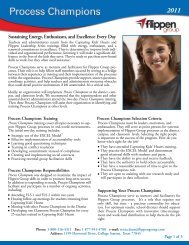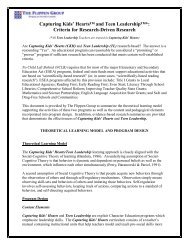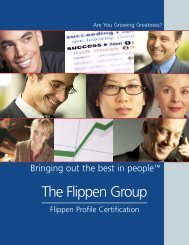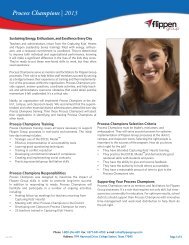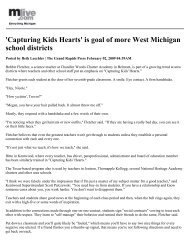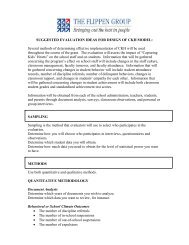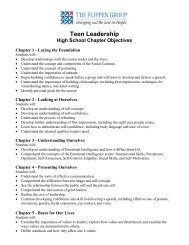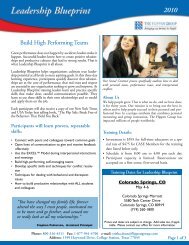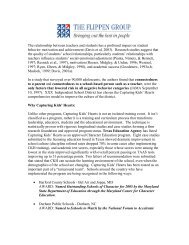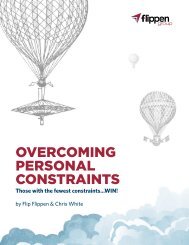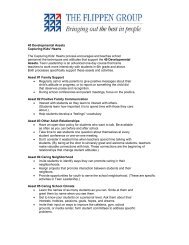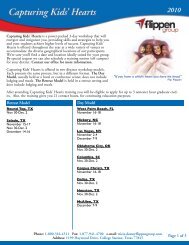Smart & Good High Schools - The Flippen Group
Smart & Good High Schools - The Flippen Group
Smart & Good High Schools - The Flippen Group
- No tags were found...
Create successful ePaper yourself
Turn your PDF publications into a flip-book with our unique Google optimized e-Paper software.
CHAPTER 6: Commonly Asked Questions about <strong>Smart</strong> & <strong>Good</strong> <strong>High</strong> <strong>Schools</strong>be, or can replace something that isn’t doing what it wasintended to do.For example, you might not have an honor code. Havingone would fill a void. You might have a student government,but modifying it to allow for greater schoolwideparticipation would make it more effective. Or you mighthave a system of disciplinary consequences that you feeldoes little to develop moral character and avoid repeatoffenses—and you really want to try a very differentapproach.You talk a lot about the development of a “ProfessionalEthical Learning Community.” Why so much emphasison this if student results are the real bottom line?Research indicates that collegiality differentiates a learning-enrichedenvironment from a learning-impoverishedenvironment. What does that mean? You can’t hope tohave faculty and staff do their best teaching unless theyare able to work well together. Student performance, theresearch shows, is improved by having a professional ethicallearning community where colleagues share theirpractices and seek constructive critique, where test scoresare shared to discern strengths and weaknesses in teachingstyles, where colleagues act as “Critical Friends” in thepursuit of excellence.Student performance improves whencolleagues share and criticallyevaluate their teaching practices.This kind of collaboration won’t and can’t take placeunless there is a community that is defined by the normsof respect, civility, integrity, and collective responsibility—and that makes time for ongoing collaboration. That’swhat a professional ethical learning community is.How do you develop that kind of a professional learningcommunity if you don’t already have one? Wheredo you start?Start with how you use what you’re already doing. ForGreat learning and superior ability areof little value unless honor, truth, andintegrity are added to them.—ABIGAIL ADAMSexample, how are faculty meetings used? If people feelthey aren’t as productive as they could be, can they beused differently—to share practices that are working andto look at the alignment of practices with the outcomesyou want in your graduates? Can you get at least one CriticalFriends <strong>Group</strong> formed and meeting on a regularbasis? <strong>The</strong> research shows that teachers who participate inCFGs say their teaching gets better every year. <strong>The</strong>re’s awhole website (www.nsrfharmony.org) devoted to how toimplement CFG’s. If you did one thing to jump-start yourPELC, we think this would be a great choice.But what if you can’t even begin the conversation withcolleagues or administrators in your school?That takes us back to the Power of One. Begin with yourselfand your sphere of influence. As a teacher, counselor,coach, parent, or administrator, you can begin to makecharacter the pathway to excellence and ethics. Help yourstudents see the connections between effort and outcome.Share the results you’re getting with at least oneperson on staff that you can talk to.Do the ideas in the report apply to schools where studentsare already high achievers and pretty good kids?Absolutely. As the old saying goes, “From those who havebeen given more, more is expected.” We want our goodkids to be great kids—by realizing their full potential, ethicallyas well as intellectually. <strong>The</strong> national studies ofcheating show that two-thirds to three-quarters of students,including the “best and the brightest,” admit tocheating on a test or major assignment in the past year.<strong>The</strong>y typically carry that pattern into college, where studiesshow that in the absence of an honor code, 75%cheat, and often into their adult lives where they maycheat on everything from their taxes to their spouses.What kind of leaders do we want? Our high-achievingkids are going to lead our communities, our corporations,our schools, our country. Do we want them to be moralleaders? If so, what are we doing in our schools that contributesto that goal?A great educator is a“maximizer of potential.”Moreover, we think there are plenty of talented kids whodon’t come close to realizing their full potential becausethey don’t have performance character. <strong>The</strong>y don’t perseverein the face of difficulty, don’t work on things they’renot good at, don’t work well with others. <strong>The</strong>y stay intheir comfort zone, hide from real challenges. Test scores216<strong>Smart</strong> & <strong>Good</strong> <strong>High</strong> <strong>Schools</strong>



